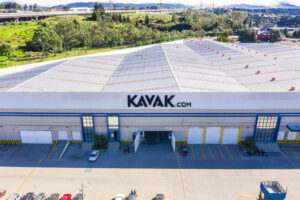
Por Stiven Cartagena
October 4, 2024
After receiving almost 40 applications, Impacta VC, the Chilean venture capital fund that invests in companies with social impact, announced the selection of 13 Latin American startups to support them in their softlanding process to the United States, specifically in Miami.
The selected startups have accumulated sales of $6.3 million dollars in the last year, according to the investment fund. In addition, all of them have open rounds or want to open them in the near future, and are looking for U.S. investors.
The selection of these 13 startups marks the first cohort of Impacta Miami Softlanding Program 2024, an internationalization program carried out in conjunction with the Cambridge Innovation Center. It’s objective is to support its founders to scale and succeed in the U.S. market, providing access to new markets, accelerated growth, and strategic connections with investors and experts.
With a market that has proven to offer a 34% growth in the last 10 years for new startups coming to the country, the United States is positioned as a relevant player for the expansion of new companies seeking to conquer bigger markets.
The truth is that soft landing, or accompanying companies in the process of internationalization in a destination country, is not new in the region.
In 2019, the global accelerator MassChallenge announced a softlanding program for Mexican startups; there’s also Parallel18, a Puerto Rican incubation program, which promotes itself as a place for international startups to enter the U.S. market; and there is The Ganesha Lab, a Chilean biotech accelerator, which also helps startups reach the U.S. through soft landing.
What is relatively new, however, is the current state of the Latin American ecosystem. Following the “funding rush” of 2020 and 2021, investors have adjusted their portfolios significantly, making soft landing in the U.S., where more capital is available, much more attractive for startups with the ability and potential to do so.
While venture capital funds are returning to Latin America to invest in some of the thousands of startups that are constantly emerging, they are doing so with extreme caution.
The most recent figures indicate that in the first half of this year the amount invested increased 30% over the same period last year, although the number of investment rounds fell by 63%.
“What happened with the venture capital rush is that everyone wanted to start with a million dollars,” said David Alvo, CEO and founder of Impacta VC. “Now, there are no longer millions of starting dollars, and that’s not necessarily a bad thing. We have too much technology and methodologies like Lean Startup that allow us to create companies very efficiently and cheaply. Also, learning to be efficient with resources from the beginning is the best school,” explains the investor.
The challenge for startups, according to Alvo, lies in the fact of “going back to basics”.
On the topic of softlanding, Alvo adds that it is still a great opportunity right now, especially in larger markets like the U.S., because investors are willing to inject larger sums of money.
“The largest exits from this fund will probably continue to occur in the U.S., because in Latin America, and particularly in Chile, there are still not enough corporations making $500 million, $1 billion or $3 billion acquisitions. Therefore, the big exits are still in the United States,” said Alvo.

With the goal of conquering new markets to increase their revenue capacity, startups are looking to expand their operations to other markets, however, it is important to do so with a clear understanding of why they want to expand, and how to take advantage of the opportunities offered by the region.
Alvo explains that Latin America plays an important role as a bridge to the U.S. market, something that is currently not sufficiently exploited.
“Latin America has a natural advantage that we have not taken advantage of: We are in the same hemisphere and in the same time zone, with a difference of just two hours. We should be working more together, and what we are doing at Impacta is precisely creating that bridge between the United States and Latin America,” says Alvo.
“What we are doing, together with CORFO (Chilean government’s Production Development Corporation), is helping companies understand how the venture capital game works in the United States.”
However, there are things that need to be addressed in order to carry out a proper soft landing strategy in a new market. One thing history has left us with is learning from other cases that did not end so well.
According to a report by the MIT Innovation Office, one of the main reasons why startups fail to enter the U.S. market is due to lack of knowledge of the local market and network of contacts.
For Alvo, the strategy lies in the fact that startups must know their market well in order to be able to evaluate it before making an introduction to it, this takes time, and for this soft landing programs provide the necessary evidence.
“It’s not that startups come back after two weeks with customers, equipment and everything they need,” Alvo said. “They’re going to do an immersion to understand if there really is a market for them in the U.S.”
The long-term goal, according to the entrepreneur, is to build a community of Latino entrepreneurs who can share their learnings on how to enter the U.S. market and thus support future generations.
“If we build this bridge between Latin America and the United States, Latin America could surpass Europe and Asia in terms of venture capital. This is because U.S. venture capital is the strongest in the world: it creates ideas, invests in their growth and facilitates the sale of companies,” he said.
But Alvo doesn’t see the future of soft landing as a one-way street where startups look to leave the region to focus on the U.S.; the ultimate goal is to build a bridge between the two continents that connects both ecosystems for mutual benefit.
“The idea is to bring companies to the U.S. and, subsequently, bring U.S. buyers to Latin America. This exchange of knowledge is crucial, where current entrepreneurs can bring all their experience and share it with the new generations. That is extremely important,” concluded Alvo.

Por Yanin Alfaro
February 17, 2026

Por Israel Pantaleón
February 17, 2026

Por Stiven Cartagena
February 13, 2026